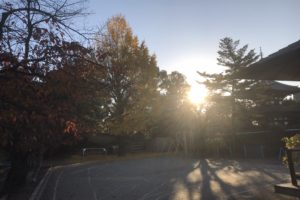October 1, 2023
18th Sunday after Pentecost, Proper 21, Year A
Matthew 21:23-32
Rev. Misa Furumoto
Responding to his father’s call, the older brother initially says, “I don’t want to!” but later changes his mind and goes out. Meanwhile, the younger brother cheerfully replies, “Yes, Father, understood!” but ends up not going at all. Which of the two did the will of his father? Yes, it’s the older brother, it’s very simple. However, its simplicity allows for deep reflection each time we ponder what the story tries to convey to us living now.
In this story, the older brother who initially refused but later went is praised. If you think about it, his initial complete rejection, “I will not”, is quite significant. Back then, unlike today, a father’s command was absolute under the patriarchal system, so such a response might have been risking disinheritance.
The younger brother gives a polite response, ” I go, sir.” It’s probably the kind of response that parents around the world would love. Yet, this younger brother, despite his polite words, disobeys his father’s order. He might be the type that disappoints people the most.
Another interesting point is that there are only these two brothers. You might expect another sibling, one who says, “I will, sir” and then actually goes. But there isn’t. This household with only two imperfect brothers represents our world. It suggests that we humans are all born with sins and imperfections.
Now, which type are you? As for me, by nature, I’m entirely like the younger brother. I’ve always been eager to try new things. Whenever something new appears before me, I quickly raise my hand, eager to jump in and say, “Yes, I’ll do it!” But often, I can’t. I quickly lose interest or get distracted by something else or get discouraged when I realize my own lack of capability. I’m the type that struggles with consistency.
But I also have an experience of realizing I was more like the older brother. Not by my own will, but by the sense that I was led by a power greater than myself. I was born and raised in a church in Kobe where my father was the priest. The rectory where we lived, located on the second floor of the kindergarten adjacent to the church, was quite small, and was built such that the congregation members could freely come up from inside. There was no privacy; we couldn’t distance ourselves from the church. There was no option to skip Sunday worship. Around middle school age, I thought, “I’ve had enough!” and planned my escape. In my first year of high school, I studied abroad in the US, firmly telling God and the church, “I don’t want this.”
For the first time in the dormitory in America, I experienced a life where I didn’t have to go to church and could sleep in on Sunday mornings. Literally, I felt like I had caught freedom. But one day, I felt an intense thirst in my heart. Homesickness, loneliness from having no friends, frustration at not being able to speak English – I think all these torments became overwhelmingly profound. Then, it suddenly occurred to me, “Let’s try going.” To a church. The church I attended was large, filled with unfamiliar adults. I couldn’t understand a word of the pastor’s sermon, and the entire experience was uncomfortable. But as I was leaving, I felt a resonance deep within: “Welcome back.” It was the voice of Jesus. Despite receiving baptism as an infant and being confirmed at age 12, it was then that I truly encountered the Lord. Time passed, and after a very winding path, I ultimately returned to the very church I had once decisively rejected.
The older brother in this morning’s story initially says “I will not,” but later changes his mind and goes out. The phrase “changes his mind” in Greek is “metamelomai”, which carries the meaning of “to become concerned about or interested in”. In other words, something or some relationship that one had previously shut out or been indifferent to suddenly becomes forefront in one’s mind. This is not something that can be accomplished by our meager human strength. It’s the work of the Holy Spirit. Only through the Holy Spirit, we can encounter Lord Jesus. And only then can we genuinely change our minds, thinking “Yes, let’s go to the vineyard,” and answer our Father’s call.
It is this Lord Jesus Christ who, as the only human, responded with “I will, sir” and went to the vineyard. Today’s second reading was from Philippians Chapter 2. It says, “Who, though he was in the form of God, did not regard equality with God as something to be exploited, but emptied himself taking the form of a slave, being born in human likenes. And being found in human form, he humbled himself and became obedient to the point of death—even death on a cross!” This same one, who was obedient to God from beginning to end, is the one who invites you to the vineyard. Without His invitation, we would not be able to perceive the call from Father, nor would we grasp the intentions embedded within that divine call.
So, what is this vineyard? What do we do there? There we cultivate grapes bursting with the vitamins of God’s love, so juicy that just one bite quenches our parched throats and revitalizes us with new life. That is what God desires. This is the Kingdom of God.
The older brother who initially showed no interest but later changed his mind and went to the vineyard is likened by Jesus to the tax collectors and prostitutes of that time. These individuals, previously scorned and branded as sinners by society, shunned and shamed, encountered God’s love through Jesus. They were given newfound strength and hope. They were transformed, becoming messengers who would share that divine love with others.
In contrast, the younger brother who said he’d go but never did represents the Jewish religious leaders. They believed they could attain salvation on their own, clinging desperately to the law, even if it meant pushing away the weak. They were blinded when they encountered Jesus and couldn’t recognize Him as the Savior. While it is written that they promised to go but didn’t, it’s possible they genuinely wanted to but simply didn’t know the way to the vineyard. No one can reach the vineyard without going through Jesus, without encountering Him. Without Him, the very desire to go may never arise.
Let’s head to the vineyard. The vineyard exists where we live: at work, school, home, everywhere. Having met the Lord, we know the taste, aroma, and freshness of the grapes, understanding that they bring eternal life. Let’s work in God’s vineyard and deliver these life-giving grapes to as many people as possible.
In the name of the Father, of the Son, and of the Holy Spirit, Amen.














